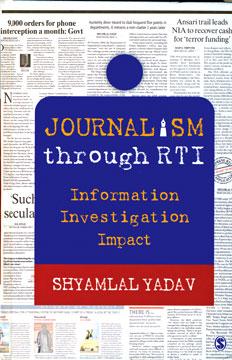
The Right to Information (RTI) has helped investigative journalism in getting information that otherwise would have been almost impossible to unearth despite legal provisions. Since the introduction of RTI in India, the face of investigative journalism in that country has changed forever. One of the key journalists who actually used RTI to reveal some of the crucial information is Shyamlal Yadav, a senior editor of ‘The Indian Express’ newspaper based in New Delhi.
His reports with the support of RTI became globally known within a short duration and today Shyamlal is well recognized as an investigate journalist. He is one of the main reasons that India’s RTI law is so powerfully effective.
In Journalism through RTI, Shyamlal attempts to share his many experiences as an investigative journalist and how he managed to use RTI effectively, how ideas were visualized, how information was collected through persistent efforts, how the story developed and how the subject was followed up keeping an eye on its rightful impact.
The stories documented in this book show how well, Shyamlal has used RTI to create a new culture in journalism in India, since the Act was introduced there in 2005, which include, from detailing corruption cases against top bureaucrats to members of Parliament employing members of their families as personal staff on taxpayer’s expense; from foreign travel of ministers to the status of funds earmarked for cleaning rivers in India.
Shaymlal says this book is useful not only for journalists but also for RTI activists, researchers and government officials dealing with RTI and for any concerned citizen who wants to use RTI as a tool to reform the system.
An RTI expert, Shaymlal Yadav recently conducted a workshop on RTI for Sri Lankan journalists in Colombo. The book is published by Sage Publishing in Delhi.
